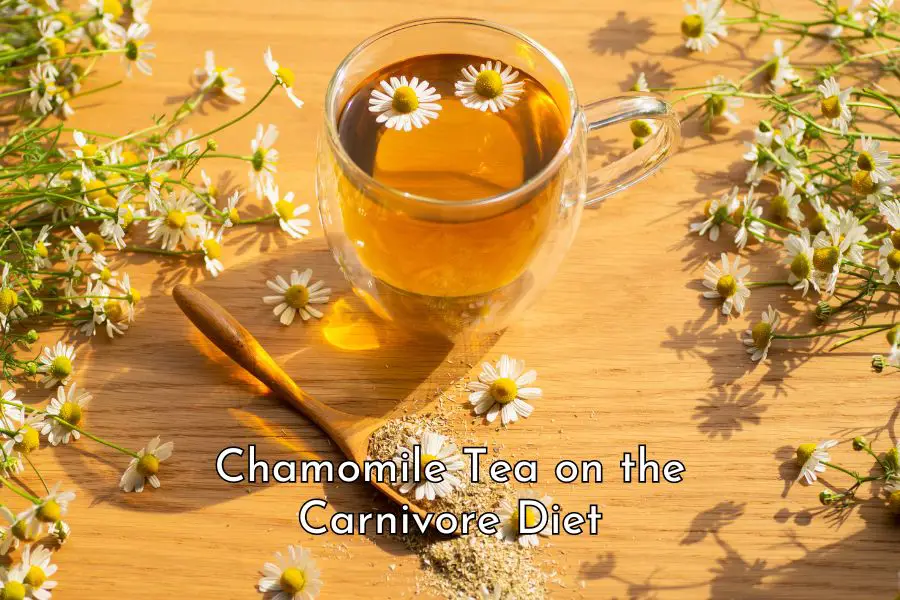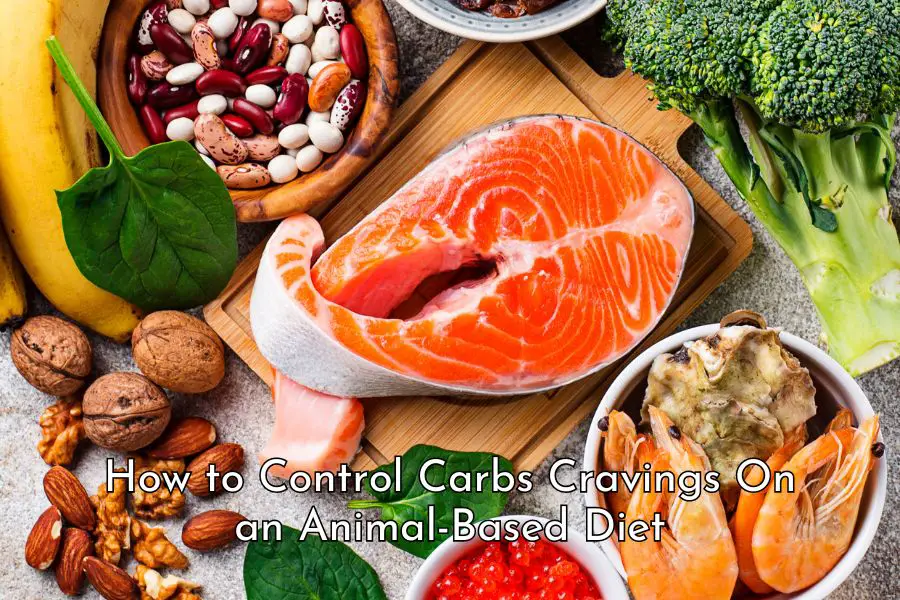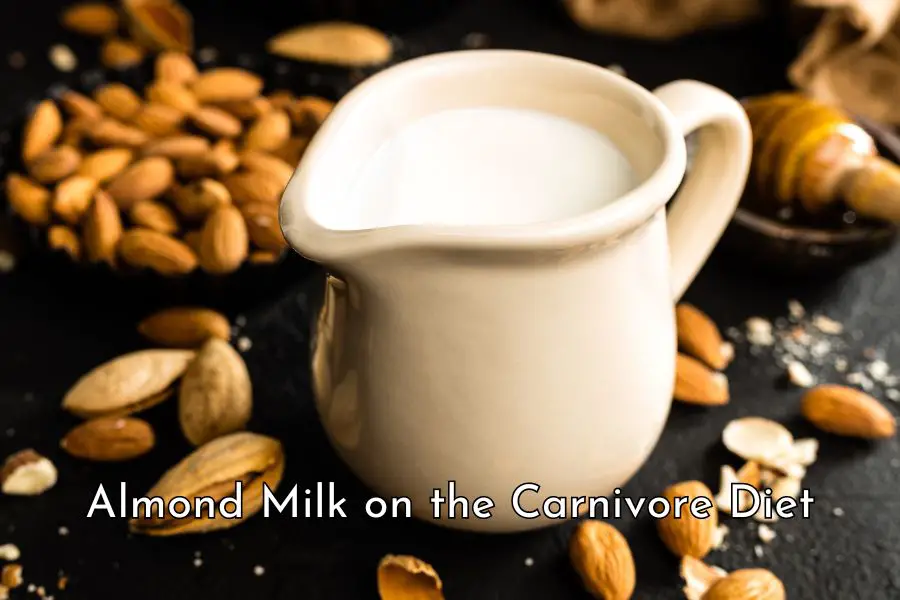You certainly can follow the carnivore diet on a budget and this in-depth post will show you how to do it on a budget and still meet all your nutritional needs.
If you are on the carnivore diet right now, you are in luck because while the rest of the world is still fixating on the idea of a healthy rainbow plant-based diet, you can do it healthily and very cheaply with animal-based food.
In this post, I will explain why you will definitely save money on the carnivore diet without even trying, some tips to save even more money on this diet and how to create nutritious meals on a budget.
Why you will save money on the carnivore diet without trying
One of the concerns people often have when going carnivore is the cost of meat.
Yes, meat does seem very expensive compared to tofu, flour, lentils, potatoes, and rice. But don’t let this hold you back.
If you track your food cost, you will find that it’s going to go down rather up on the carnivore diet without you even trying. This has been my personal experience. The main reasons for the significant reduction in food costs are set out below.
1. You will save a lot of money on drinks
You will be saving a lot of money cutting out alcohol, coffee, tea, fruit juice, soft drinks, etc. These drinks can all add up to a lot of money quickly.
If you cut out two cups of coffee, a glass of wine, and a soft drink a day, you will already save enough to buy a pound of budget meat, around half of your daily meat intake.
The only thing that you should drink on this diet is water which costs next to nothing. It is also the best drink you can have on this diet.
The other good drink on the carnivore diet that you can make yourself is bone broth. But bones are very cheap these days, some butchers even give away for free. A couple of pounds will make a week’s worth of broth. Here is a link to a very easy bone broth recipe.
If you don’t have problems with milk, raw milk is also good to have, but raw milk is generally expensive so it’s better to avoid milk if you are on a budget. You can get all the nutrition you need on a budget, including calcium and I will show you how below.
2. You will save a lot of money on snacks
On the carnivore diet, you will no longer pay for potato chips, veggie straws, pretzels, crackers, snack bars, muffins, and the like which can add up to a lot of money quickly.
On this diet, you will be burning fat rather than sugar and your energy level will be very stable throughout the day, hence the need to snack will reduce significantly.
In addition, meat is so satiating and satisfying. Your body knows it when you are feeding it the nutrients it needs. As a result, your craving will go down dramatically on this diet. You will find that you really don’t need to eat snacks on this diet after you have fully adapted to it.
When you first transition to this diet, however, it is still a good idea to make some carnivore snacks ready so that you don’t fall off the wagon and grab something unhealthy. Please check out this shredded beef recipe if you are in this early stage. I think this is the best snack you can eat on the carnivore diet.
You will definitely save a lot of money from not buying all those sugary snacks. Price per pound for some of those sugary snacks can be more expensive than rib-eye steak.
For example, potato chips cost from 30 to 50 cents per ounce or $5 to $9 per pound. For the price of a bag of chips, you can buy half a pound of budget ground beef or a cheap cut of meat.
3. You will save a lot of money due to zero waste on the carnivore diet
On the omnivore, vegan or vegetarian diets, you will occasionally have fruits and vegetables that go off. Squashed bananas, bruised mangoes, overripe avocados, sprouting potatoes, moldy strawberries, etc would have to go into the bin.
In addition, you can’t eat a significant proportion of what you pay for due to peeling, coring, trimming, and de-seeding.
But there is literally no waste on the carnivore diet. You eat what you pay for, there is no need to peel, core, de-seed, or anything like that with animal-based food.
Throw a steak on the grill or turn ground beef into burger patties and fry them up, nothing goes to waste.
If you buy meat cuts with bones, save the bones to make bone broth and eat the leftover soft bones for calcium to save money and practice zero waste.
4. You will save a lot of money and time on cooking
There are so few ingredients in all carnivore diet recipes. In most cases, you just need meat, salt, and a bit of seasoning.
Cooking will become so simple and you will save a lot of time on prepping and cooking, leaving you more time doing more meaningful and fun things.
Some vegan, vegetarian, and omnivore recipes can be simple but, in general, they require a lot more ingredients, more time to prepare and cook than carnivore dishes.
As a result, you will save money on gas and electricity and buying all those cooking gadgets: toaster, sandwich maker, blender, rice cooker, slicer, spiralizer, pasta maker, juicer, air fryer, and the like. If you have those in possession at the moment, you can either give away or sell them off cheaply to buy more meat.
All you need on the carnivore diet is a few pots, a set of good knives, and a couple of frying pans, and an oven.
5. You can buy true superfood on the carnivore diet cheaply
The most treasured food on the carnivore diet, liver, is presently super cheap in most Western countries.
One day, the rest of the world will catch up with you and realize that liver and other organ meats are the real superfood, not the kale, spinach, almond, avocados, quinoa, or goji berries.
Instead of spending money on those plant “superfoods”, you can buy liver and other organ meats at a quarter or a third of the price of average meat cuts.
6. You will save a lot of money on health care
You will save a lot of money on health care for sure as well.
Many people have reported getting off all of their medications after going carnivore and, for some, this is a significant saving.
You also don’t need to supplement with vitamins and minerals on this diet. Animal-based food can provide you with all the nutrients your body ever needs.
As your physical and mental health improves on this diet, your need to visit health care professionals will decrease and save you even more money.
Tips to save even more on the carnivore diet
1. Get cheaper cuts and animal fat
This is a no-brainer but many people mistake cheaper cuts for poor quality meat.
Let me assure you, they are just as nutritious as the more expensive cuts of meat.
Some meat cuts are more expensive than others just because they make up a smaller portion of the animal and are more tender. Due to high demand, they cost a lot more. But that doesn’t mean they have more nutrients than cheaper cuts.
What matters a lot more is how the animal is raised.
I would rather go for cheap offcuts from 100% grass-fed cows than ribeye steaks from grain-fed cows.
So, if you are on a budget, go for cheaper cuts of meat (beef dice, chuck steak, sirloin, ground beef, etc.) knowing that they are just as nourishing as the more expensive ones.
If you happen to get steak from the muscle that has done a lot of work and is a little bit tough, get a good sharp knife and cut it into smaller pieces.
You definitely don’t need to chew it 30 to 40 times like in the case of plant food in order for your body to digest meat properly. Your digestive system can do a perfect job at that.
The acidity of the human stomach is even higher than in carnivores, equaling that of scavengers indicating that our physiology is suitable for a meat-based diet.[1, 2]
Your stomach is about 1000 times more acidic than those of chimpanzees and would have no problem digesting even the toughest piece of meat.
When did you notice a piece of meat coming out the other end? Most likely it’d be corns, beans, pieces of carrots, and peas!
Also, get fatty cuts of meat, they are cheaper and definitely taste a lot better than lean meats. You usually can buy fat trimmings and suet for much less than the price of ground beef. And because they are very calorie-dense, they will last you for days.
2. Learn to eat organ meats regularly
Organ meats are super nutritious and currently are very cheap so they are great to add to your diet if you are on a budget.
In the US and some other developed countries, you can get organ meats for the price of soup bones and some butchers happily give them to you at an even cheaper price if you are a regular customer.
In some countries, organ meats are so treasured that they are more expensive than lean muscles meats. Have a look at their nutritional profiles of various organ meat in the table below (next section) and you will see why it is the case.
Even if you are not on a budget, it’s important to regularly add a small amount of organ meats to your diet.
Personally, I try to have a couple of small slices of liver on most days. I’d add in other organ meats like heart, kidney, brain, tongue, and tripe if I happen to find them.
If you are new to organ meats, I suggest trying heart, tongue, testicle, tripe, bone marrow, and brain first. Heart, tongue, and testicle taste more like muscle meat and are a bit denser. Tripe is very mild in flavor and needs to be cooked quickly. You can then try bone marrow and brain. They have buttery and savory flavors. Perhaps try liver and kidney last because, in my opinion, they have stronger organ tastes that are very different from ordinary meats.
3. Get a deep freezer
If you have tried the carnivore diet and decide to stick with it long-term, I definitely recommend getting a good size deep freezer.
This up-front investment is definitely worth it long-term.
With it, you can buy a quarter or half a cow at a very cheap price. You just need to order once and are done with shopping for a few months to half a year.
It also gives you an option to buy a lot of meat when you happen to find good meat on sale or marked down for quick sale.
On the carnivore diet, you don’t need a very big fridge, so when your current fridge dies, replace it with a smaller fridge to reduce ongoing costs.
4. Buy in bulk directly from farmers
If you live alone and don’t have a lot of freezer space, still see if you can organize with relatives and friends to buy the whole cow, lamb, or goat and split it up.
It will save a lot of money and you will be truly eating nose-to-tail. You will also eat lean, fat, bone, and organ meat in a perfect natural ratio.
You usually can give specific instructions on how you would like the whole carcass to be cut so it is easier to share.
An alternative is to look at warehouse stores like Costco, Sam’s Club, and Walmart, and Restaurant Depot and always get the biggest packs of meat you can find.
Also, visit butchers around your area and see what you can find and whether you can get a bulk discount.
I found a butcher near my place which has fresh stock arriving every Tuesday. So, I’d come on Tuesday afternoon or Wednesday morning and always find an abundance of fresh organ meats. I can get liver, heart, and kidney from them for the same price as soup bones (about $2.5 – $3.0 per pound). I can also get a quarter or half of a goat for just $7 a pound.
5. Other ways to save money with the carnivore lifestyle
Below are some other ideas to help you save money with a carnivore lifestyle.
Get rid of as many chemicals in your house as possible. For millions of years, our ancestors spent their entire lives outdoors and certainly weren’t exposed to so many chemicals like us these days. These chemicals can’t be good for us or the environment despite what the labels and health authorities might say.
These include cleaning products, shampoo, conditioner, shower gel, cosmetics, weed killers, insect spray, etc.
Consider washing your hair with just water or with a bit of baking soda and rinse with vinegar. Just look at the list of chemicals in your shampoo and conditioner and see whether it is a good idea to put them on your body.
Get rid of all cosmetic products or use them on rare occasions only. Many people reported improvements in hair and skin health on the carnivore diet. Maybe you don’t need to apply make-up after all.
Consider showering with just water or use soap sparingly for underarms or rear only if you must. There is a protective layer of oil on your skin and excessive use of soap and cleaning products will dry up your skin.
Avoid sunscreen. They are full of harmful chemicals that can penetrate your skin and go directly into your bloodstream after just one day. Our ancestors spent most of their time outdoors. Humans are outdoor animals. There are so many benefits of sunlight exposure, and vitamin D is just one of them.
If you have any concerns about sunburn, wear a hat, long-sleeve shirt, and avoid the mid-day sun. I haven’t used sunscreen for years because I always hate the smell and how it sticks to my body afterward. But surprisingly, since switching to this animal-based diet, I can stay for a couple of hours in the sun without getting burnt. And this is the experience of many others too. It’s amazing what the right diet can do for your body.
Consider ditching gym membership (especially if you hate routine and fail to turn up regularly) and immerse yourself in nature and do as many things outdoor as you can.
I can go on and on, but you get the idea. Basically, just try to imitate the way our ancestors lived for millions of years because it is what determines our physiology. It’s better for your health, good for your environment and saves you a lot of money.
How to create nutritious carnivore meals on a budget
What you need to create nutritious carnivore meals
You can create a simple and nutritious meal on a budget with the following ingredients:
- Any budget ruminant meat you can afford (cheap beef, lamb, bison, or goat cuts or their ground meat),
- Any organ meat from these ruminants you can afford, and
- Any bones from these ruminants you can afford.
These are also three main items that you should look for when shopping.
If possible, for every meal or most of your meals:
- Use ruminant meat as the base of your meal, for example, a couple of cheap steaks, a few burger patties, a big bowl of stew meat, or a few slices of meatloaf
- Add a couple of slices of liver, heart, kidney, or testicle. Please check out some easy organ meat recipe here
- Add a small cup of bone broth. Here is a link to an easy bone broth recipe
- Add a couple of pieces of soft bones that you keep after making bone broth or add a teaspoon of bonemeal. Here is the instruction on how to make bonemeal.
You will get all the nutrients you need from this meal, even down to vitamin C (if you often eat blue or rare steaks, meat patties that are still pink inside, and seared organ meats), vitamin K, calcium and folate.
As can be seen in the table below, beef and a few beef organs can provide you with all essential nutrients.
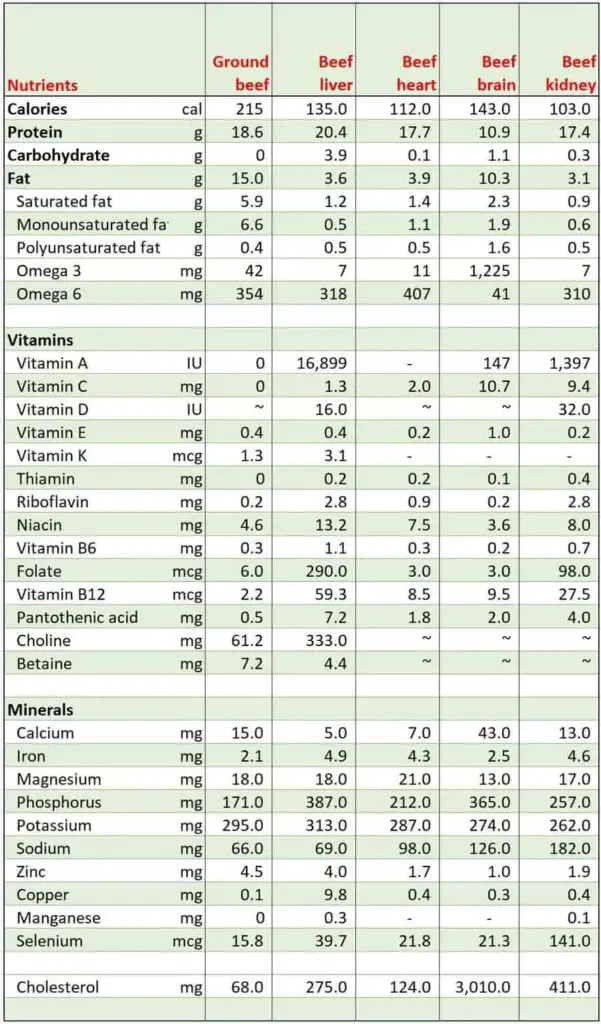
Though some of the essential nutrients are only in small quantities, due to the absence of plant anti-nutrients on this diet, the absorption rate would be much better than when you are on a mixed diet.
Also, I wouldn’t worry too much about meeting the recommended daily intake of many nutrients because these are for the general population, many of whom are on the standard American diet and their needs might be higher due to poorer absorption of nutrients from non-animal sources.
I have previously mentioned in this post that you should eat a variety of animal-based food to get all the nutrients your body needs. This was the way our ancestors lived, they hunted, scavenged, and ate whatever they could find so they had no choice but to eat a wide variety of animal-based food.
However, they had access to good quality food. Today, most of us only have access to farmed animals and most of them are raised in poor conditions. You’d be better off focusing on the animals that are best raised which are ruminants.
Farmed ruminants still spend most of their lives outdoor and eat a diet relatively close to their natural diets. They typically spend a large part of their lives grazing before finishing on grains. Pigs and chickens, however, generally spend their entire lives in crowded sheds or cages and are fed a composite diet that is very different from their natural diets.[3, 4]
It is true that you can get pasture-raised pork, pasture-raised chicken, wild-caught fish, but if you are on a budget, these are expensive options, so it is better to focus on the best quality farmed meat i.e. ruminant meat. Grain-fed beef is generally cheaper than genuine pasture-raised pork and poultry.
You will make up for the lack of variety in animal source food by regularly incorporating a variety of organ meats in your diet.
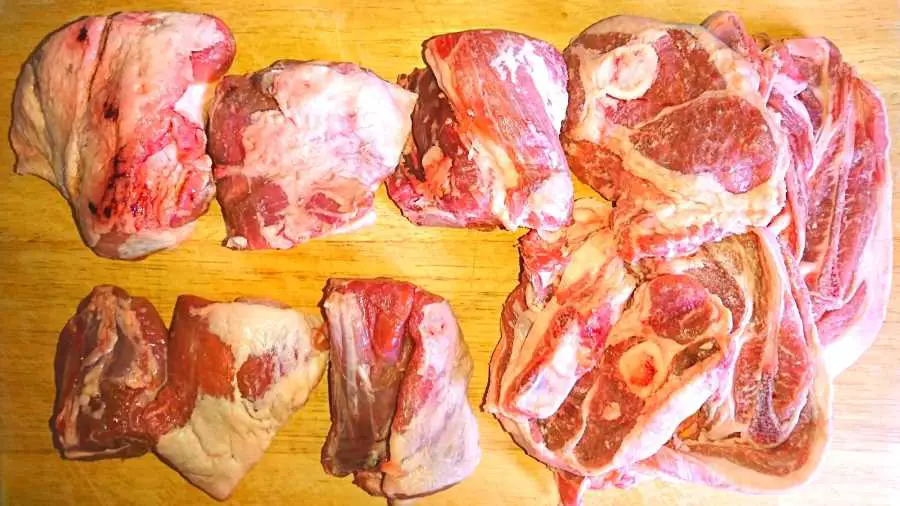
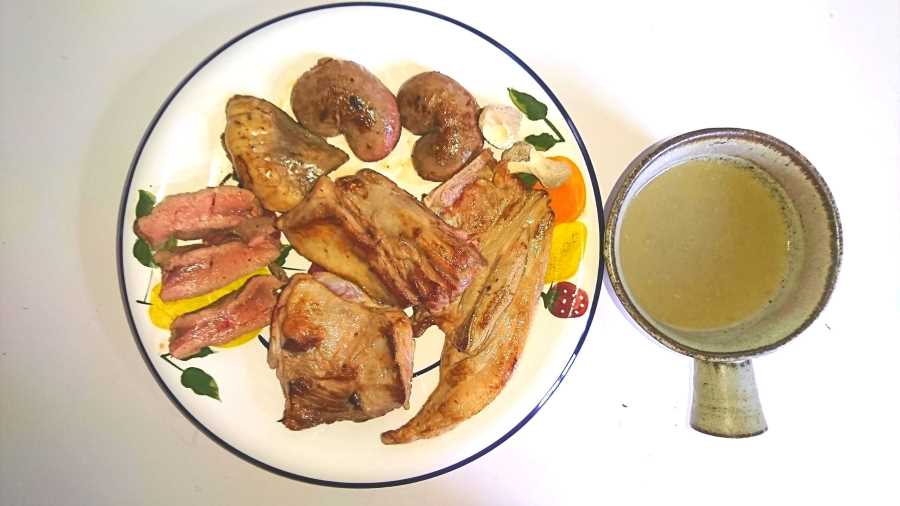
What about eggs?
Eggs are a nutritious whole food. They are a good source of complete proteins and many essential nutrients including many vitamins (A, D, E, K, folate, B12, choline), minerals (calcium, zinc, iron, copper, magnesium, phosphorous, and selenium), and omega 3 fatty acids.[5]
If you enjoy and can tolerate eggs, you can add them to your meals.
If you raise your own chickens in the backyard, eat them regularly.
If you can’t raise your own chickens and can’t afford pasture-raised eggs, it’s better to focus on ruminant meat and their organs and add caged eggs only on occasion.
What about pork and poultry?
I would stay away from pork and poultry. As I said in this post, it’s best to eat lean pork and lean chicken due to their high PUFA contents.
But if you are on a budget, lean pork and poultry are not cheap. You can get ground lamb and beef which are better quality meat than pork and poultry at the same or lower price.
What about seafood?
You don’t need to purposely add seafood to your diet if you are on a budget and following the above guidelines in creating your meals.
Farmed fish today are raised in poor conditions, treated with antibiotics, and routinely injected vaccines. Some farmed fish are even fed dye to make their flesh pink.
The best seafood to eat is wild-caught but wild-caught seafood is rather expensive. Again, being on a budget, it’s better to spend your money on ruminant meat rather than wild-caught seafood.
An alternative to fresh wild-caught is canned wild-caught fish if you like the taste. However, the BPA from the lacquer lining of the cans can leach into your food.
BPA is an endocrine disruptor and can interfere with your hormones. Endocrine disruptors can affect reproductive functions, behavior, metabolism and obesity, prostate cancer, and thyroid and cardiovascular endocrinology. [6] So, it’s not a good idea to eat a lot of canned fish even though they may be cheap. Have it only occasionally if you like.
A great cheap alternative to wild-caught seafood is lambs’ brains which is a great source of omega 3. Have it every now and then if you would like to increase your omega 3 intakes.
What about dairy?
If you can tolerate dairy, it’s okay to add a small amount to your diet, but it is not a must.
The main reason people add dairy products is they are a great source of calcium. But if you make bone broth regularly, keep the soft edible bones and add a couple of small pieces to your meal and you won’t have to worry about your calcium intake at all.
However, if you can tolerate and enjoy dairy, by all means, add a small amount every now and then to your meals.
Conclusion
I can assure you that you will save a lot of money on the carnivore diet.
Even if you are on an extreme budget, you still can create nutritious meals that your body will be thankful for.
If you can’t afford ruminant meat and organs and have to eat a lot of pork, chicken, or tinned fish, you are still doing a lot better than being on the standard American diet.
Buy the best quality food you can afford and don’t stress about what is beyond your control. Diet is very important but it is definitely not the only determining factor of health.
If you find this post helpful, please consider sharing this post and my site with your family, friends, and followers. That would be much appreciated. Please also check out my library of articles on the carnivore diet here which is updated regularly.
Disclaimer: The information in this post is for reference purposes only and not intended to constitute or replace professional medical advice. Please consult a qualified medical professional before making any changes to your diet or lifestyle.
Photo credit: Tommao Wang on Unsplash


